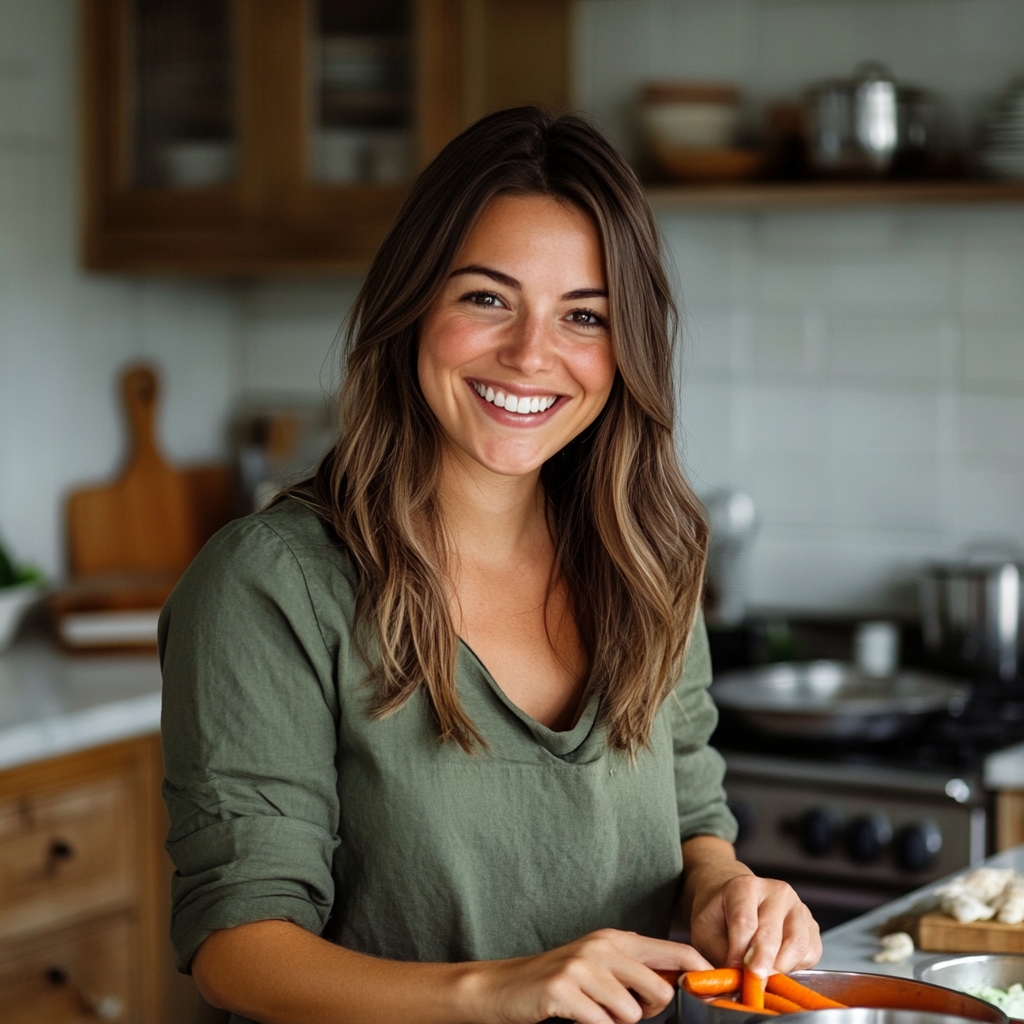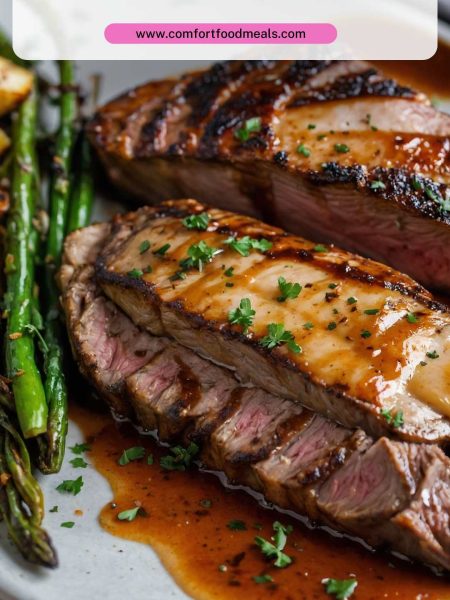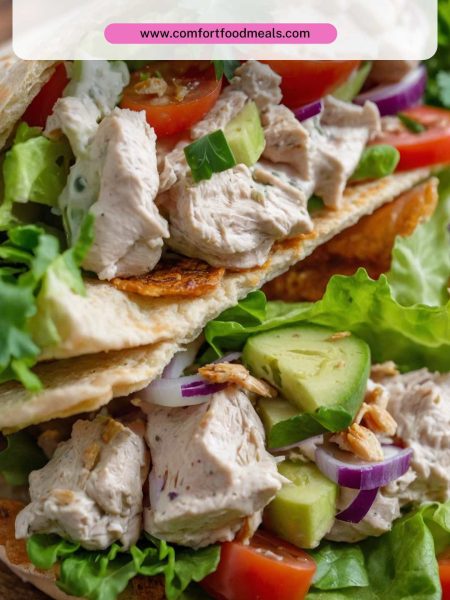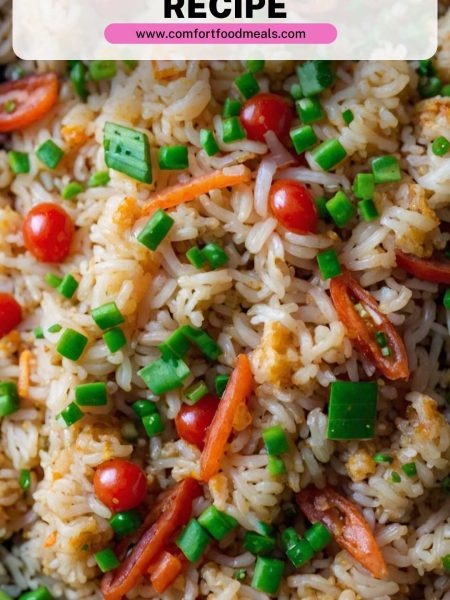When it comes to turkey, especially one wrapped in buttered cheesecloth, you’ve got to think about the sides. They are the supporting cast that helps make your turkey the star of the show.
Classic pairings include fluffy mashed potatoes, vibrant green bean almondine, or a refreshing cranberry sauce. If you want a little more punch, consider a tangy kale salad or some sweet potato casserole to balance the flavors. These combinations create a colorful and delicious spread that will impress your guests!
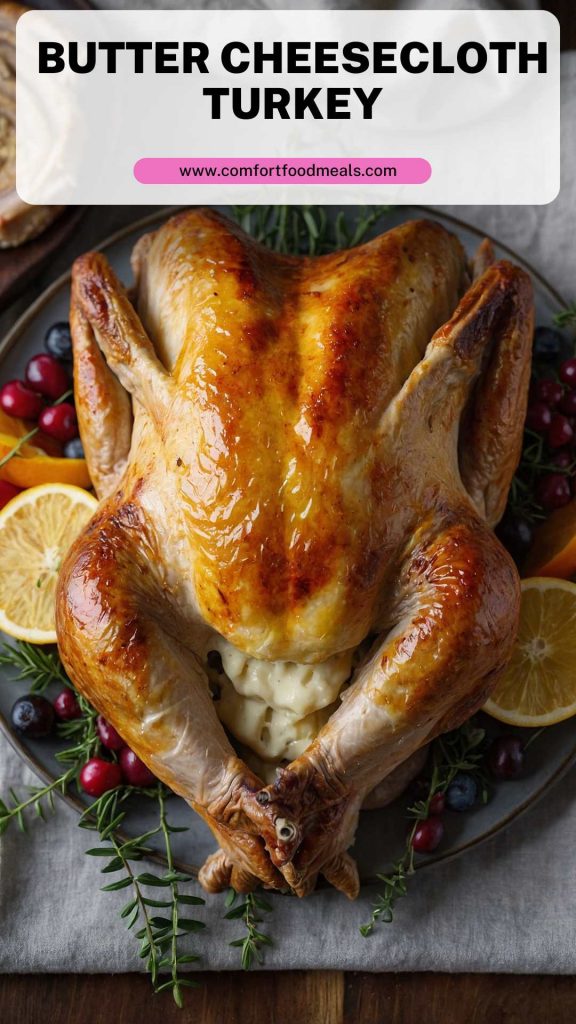
Ah, Thanksgiving! A time for family, friends, and of course, that hero of the holiday—turkey. Over the years, I’ve experimented with various turkey recipes, but none have made me feel like a culinary wizard quite like the butter cheesecloth turkey.
This technique wraps the turkey in richly flavored butter-soaked cheesecloth, ensuring a moist, flavorful bird that’s beautifully golden. The moment guests see it on the table, their eyes light up. It’s not just a turkey; it’s a centerpiece.
Over the years, I’ve learned a thing or two about cooking turkey that doesn’t dry out. This method harnesses the power of butter and cheesecloth, creating a bird that’s not only juicy but also layered with flavor. Let’s explore what this is all about!
You Might Also Like These Recipes!
Understanding the Butter Cheesecloth Turkey Recipe
At its core, the butter cheesecloth turkey recipe breathes new life into a classic dish. The cheesecloth serves as a protective barrier, allowing the turkey to steam and stay moist while developing an appetizing golden-brown skin.
The use of seasoned butter enhances the flavor profile tremendously. Instead of the traditional method of just roasting the turkey, this process elevates it into a gourmet experience.
The Flavor Profile of Butter Cheesecloth Turkey
Imagine biting into a turkey that’s tender, with a hearty savory flavor accented by herbs and spices. The aroma of rosemary and thyme wafts through the air, joined by a subtle hint of garlic. The crispy skin is a contrast to the moist meat underneath.
Each bite delivers a burst of buttery richness that complements the natural taste of the turkey perfectly. It’s a combination of familiar and decadent, bringing warmth and comfort to the table.
What Makes This Recipe Different From Other Turkey Methods?
Many turkey recipes rely solely on brining or herb rubs, which can indeed lead to tasty results. However, the beauty of the butter cheesecloth method lies in its dual action. The cheesecloth, soaked in butter, not only protects the bird but also traps moisture effectively. Other methods can dry out the meat over a long cooking period. By using cheesecloth, you get a perfect balance of crispy skin and juicy meat. Additionally, the infused butter seeps into the turkey while it bakes, making this recipe stand out.
Ingredients You’ll Need
Before we dive into the cooking process, gather the following ingredients to ensure a smooth cooking experience:
- 12 to 14-pound turkey (adjust if your bird is larger)
- Organic cheesecloth
- 2 sticks melted butter (for brushing the cheesecloth)
For the Herb Butter:
- 2 sticks softened unsalted butter
- 1 tablespoon dried rosemary leaves
- 1 tablespoon dried thyme
- 1 tablespoon smoked paprika
- 2 tablespoons sea salt
- 2 teaspoons freshly ground black pepper
- 1 teaspoon garlic powder
For Aromatics:
- 3 large carrots, roughly chopped
- 3 celery stalks, roughly chopped
- 1 large yellow onion, roughly chopped
- 6 cups low-sodium chicken broth
- 1 lemon, quartered
- 1 orange, quartered (for stuffing)
- Fresh thyme sprigs
- Fresh rosemary sprigs
Step-by-Step Directions
Now that we’ve got everything ready, let’s walk through the steps for an unforgettable butter cheesecloth turkey.
Step 1: Preparing the Turkey
Start by preheating your oven to 325°F (163°C). Remove the turkey from the fridge and let it come to room temperature, which will help it cook more evenly. Make sure to remove the giblets and the neck from the cavity. Rinse the turkey under cold water and pat dry with paper towels.
Step 2: Making the Herb Butter
In a mixing bowl, combine the softened butter with the dried rosemary, thyme, smoked paprika, sea salt, black pepper, and garlic powder. Mix well until all the spices are well integrated. This herb-infused butter will form the flavor base for your turkey.
Step 3: Seasoning the Turkey
Rub the herb butter generously all over the turkey. Don’t forget to get some under the skin on the breast and thighs for extra flavor. This is where that rich taste will really shine through.
Step 4: Stuffing the Turkey
In the turkey cavity, place the quartered lemon and orange, along with a few sprigs of thyme and rosemary. Add the rough-chopped carrots, celery, and onion. Not only do these aromatics add flavor, but they will also help keep the turkey moist.
Step 5: Preparing the Cheesecloth
Soak your cheesecloth in the melted butter. Make sure it’s completely saturated. This cheesecloth will be your secret weapon! Once soaked, drape it over the turkey, tucking it in around the bird. This will act as a shield, locking in moisture and flavor.
Step 6: Roasting the Turkey
Place the turkey in a roasting pan and pour the chicken broth into the bottom of the pan. This creates a steaming effect while roasting. Roast the turkey based on its weight; a general guideline is about 13 minutes per pound. Baste the turkey every 30 to 45 minutes with the pan juices.
Step 7: Removing the Cheesecloth
About 30 minutes before the turkey is done, carefully remove the cheesecloth. You’ll want the skin to get crisp and golden. Keep basting it with the pan juices during this time.
Step 8: Resting the Turkey
Once it’s reached an internal temperature of 165°F (74°C) in the thickest part, remove it from the oven. Let it rest for at least 20-30 minutes. This is crucial. It allows the juices to redistribute, ensuring that every slice you take is juicy and flavorful.
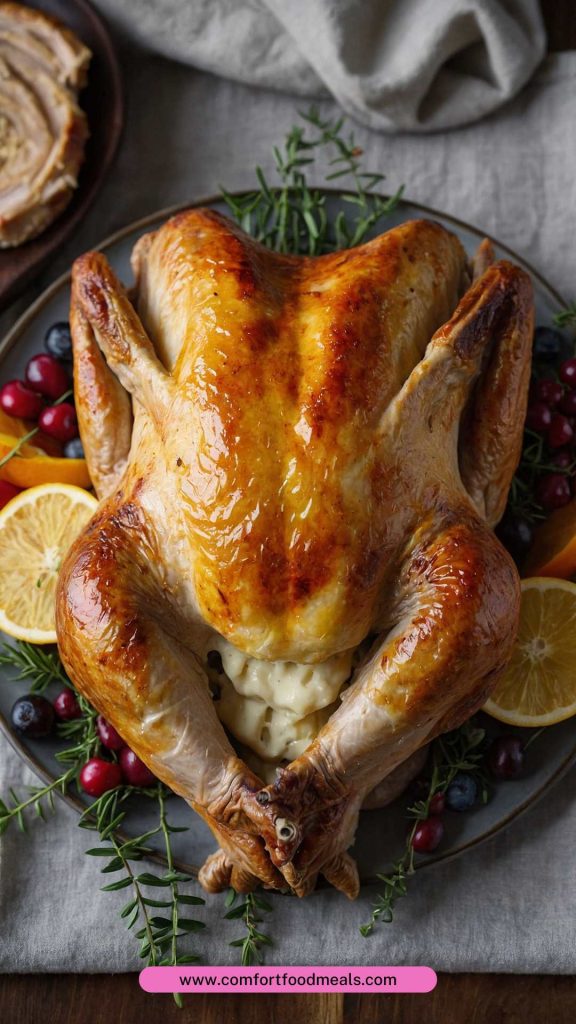
Tips on Making Butter Cheesecloth Turkey
- Don’t rush the defrost: Ensure that your turkey is fully thawed before cooking. A partially frozen bird will lead to uneven cooking.
- Use quality cheesecloth: Opt for organic or high-quality cheesecloth to avoid any chemical residues impacting your dish.
- Check internal temperature: Always use a meat thermometer for accuracy. This will help avoid undercooking or overcooking.
- Baste often: Frequent basting leads to extra flavor. It enhances moisture and creates a stunning appearance.
- Flavor the broth: Consider adding herbs and a splash of white wine to the chicken broth. This will elevate the flavors even more!
Nutrition Information
One serving (about 3.5 ounces of turkey, without skin) of butter cheesecloth turkey provides approximately:
- Calories: 175
- Protein: 26g
- Fat: 9g
- Saturated Fat: 3g
- Cholesterol: 70mg
- Sodium: 110mg
This recipe serves approximately 10-12 people, making it a suitable choice for gatherings.
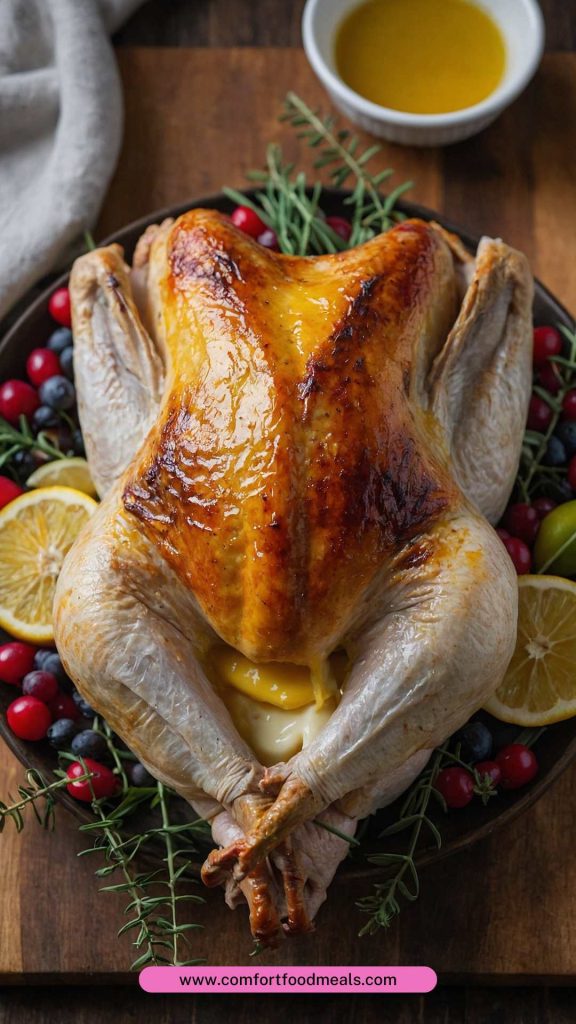
How Can I Store This Butter Cheesecloth Turkey?
After dinner, if you have any leftovers, store the turkey in an airtight container in the refrigerator. It can stay fresh for about 3-4 days. If you’re planning on storing it longer, consider shredding the meat and placing it in freezer bags. It will maintain quality for up to 3 months.
What if I Don’t Have Certain Ingredients?
Don’t worry! Cooking should be flexible. If you find yourself missing an ingredient, here are a few substitutes to consider:
- Turkey: If you’re unable to find a whole turkey, consider using chicken. Adjust the cooking time based on the weight.
- Butter: If you’re out of unsalted butter, use ghee or olive oil. Both will provide moisture.
- Herbs: If fresh rosemary and thyme aren’t available, opt for dried Italian herbs or your preferred herbs. You might miss the fresh punch but you’ll still have flavor.
- Chicken Broth: In a bind, vegetable broth will suffice, although it will add a different flavor profile.
Conclusion
Embarking on the adventure of preparing a butter cheesecloth turkey is rewarding. When executed correctly, it can transform a traditional holiday meal into an extraordinary feast. The care and attention put into the preparation truly reflect in each bite. This method not only leads to a vibrant presentation but also ensures that your turkey is the juiciest it can be.
By sharing my secrets, kitchen wisdom, and a touch of personal flair, I hope to inspire you to take on this recipe and impress your gathering with a delightful, savory turkey that all will remember. Your kitchen will be buzzing with joy and flavors, and you might just become known as the turkey whisperer. Happy cooking!
You Might Also Like These Latest Recipes!

Butter Cheesecloth Turkey – Comfort Food Meals
Description
Ah, Thanksgiving! A time for family, friends, and of course, that hero of the holiday—turkey. Over the years, I've experimented with various turkey recipes, but none have made me feel like a culinary wizard quite like the butter cheesecloth turkey.
This technique wraps the turkey in richly flavored butter-soaked cheesecloth, ensuring a moist, flavorful bird that’s beautifully golden. The moment guests see it on the table, their eyes light up. It’s not just a turkey; it’s a centerpiece.
Ingredients
For the Herb Butter:
For Aromatics:
Instructions
-
Now that we’ve got everything ready, let’s walk through the steps for an unforgettable butter cheesecloth turkey.
Step 1: Preparing the Turkey
-
Start by preheating your oven to 325°F (163°C). Remove the turkey from the fridge and let it come to room temperature, which will help it cook more evenly. Make sure to remove the giblets and the neck from the cavity. Rinse the turkey under cold water and pat dry with paper towels.
Step 2: Making the Herb Butter
-
In a mixing bowl, combine the softened butter with the dried rosemary, thyme, smoked paprika, sea salt, black pepper, and garlic powder. Mix well until all the spices are well integrated. This herb-infused butter will form the flavor base for your turkey.
Step 3: Seasoning the Turkey
-
Rub the herb butter generously all over the turkey. Don’t forget to get some under the skin on the breast and thighs for extra flavor. This is where that rich taste will really shine through.
Step 4: Stuffing the Turkey
-
In the turkey cavity, place the quartered lemon and orange, along with a few sprigs of thyme and rosemary. Add the rough-chopped carrots, celery, and onion. Not only do these aromatics add flavor, but they will also help keep the turkey moist.
Step 5: Preparing the Cheesecloth
-
Soak your cheesecloth in the melted butter. Make sure it's completely saturated. This cheesecloth will be your secret weapon! Once soaked, drape it over the turkey, tucking it in around the bird. This will act as a shield, locking in moisture and flavor.
Step 6: Roasting the Turkey
-
Place the turkey in a roasting pan and pour the chicken broth into the bottom of the pan. This creates a steaming effect while roasting. Roast the turkey based on its weight; a general guideline is about 13 minutes per pound. Baste the turkey every 30 to 45 minutes with the pan juices.
Step 7: Removing the Cheesecloth
-
About 30 minutes before the turkey is done, carefully remove the cheesecloth. You'll want the skin to get crisp and golden. Keep basting it with the pan juices during this time.
Step 8: Resting the Turkey
-
Once it’s reached an internal temperature of 165°F (74°C) in the thickest part, remove it from the oven. Let it rest for at least 20-30 minutes. This is crucial. It allows the juices to redistribute, ensuring that every slice you take is juicy and flavorful.
Nutrition Facts
Servings 10
- Amount Per Serving
- % Daily Value *
- Total Fat 9g14%
- Saturated Fat 3g15%
- Cholesterol 70mg24%
- Sodium 110mg5%
- Protein 26g52%
* Percent Daily Values are based on a 2,000 calorie diet. Your daily value may be higher or lower depending on your calorie needs.
Note
- Don’t rush the defrost: Ensure that your turkey is fully thawed before cooking. A partially frozen bird will lead to uneven cooking.
- Use quality cheesecloth: Opt for organic or high-quality cheesecloth to avoid any chemical residues impacting your dish.
- Check internal temperature: Always use a meat thermometer for accuracy. This will help avoid undercooking or overcooking.
- Baste often: Frequent basting leads to extra flavor. It enhances moisture and creates a stunning appearance.
Flavor the broth: Consider adding herbs and a splash of white wine to the chicken broth. This will elevate the flavors even more!


